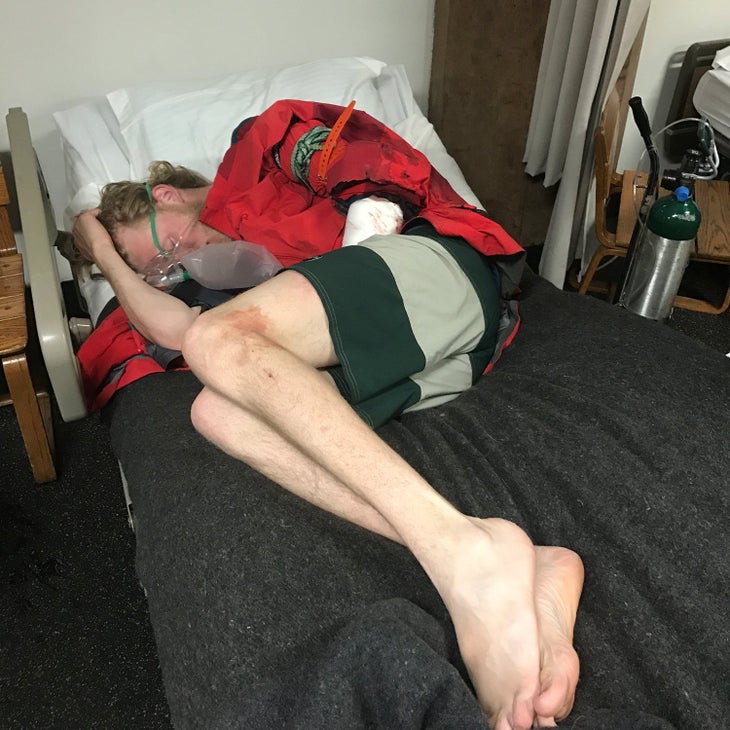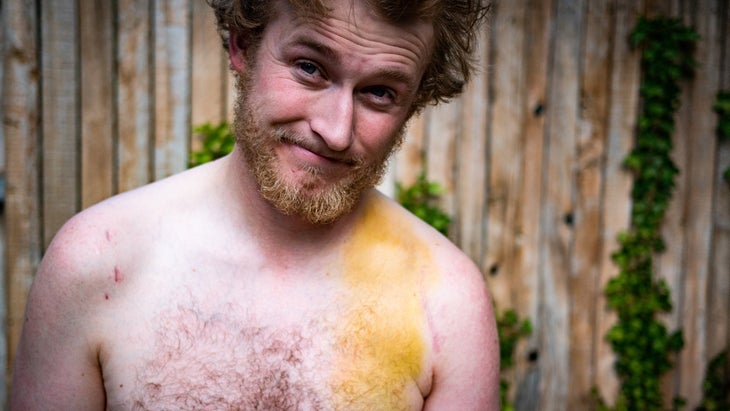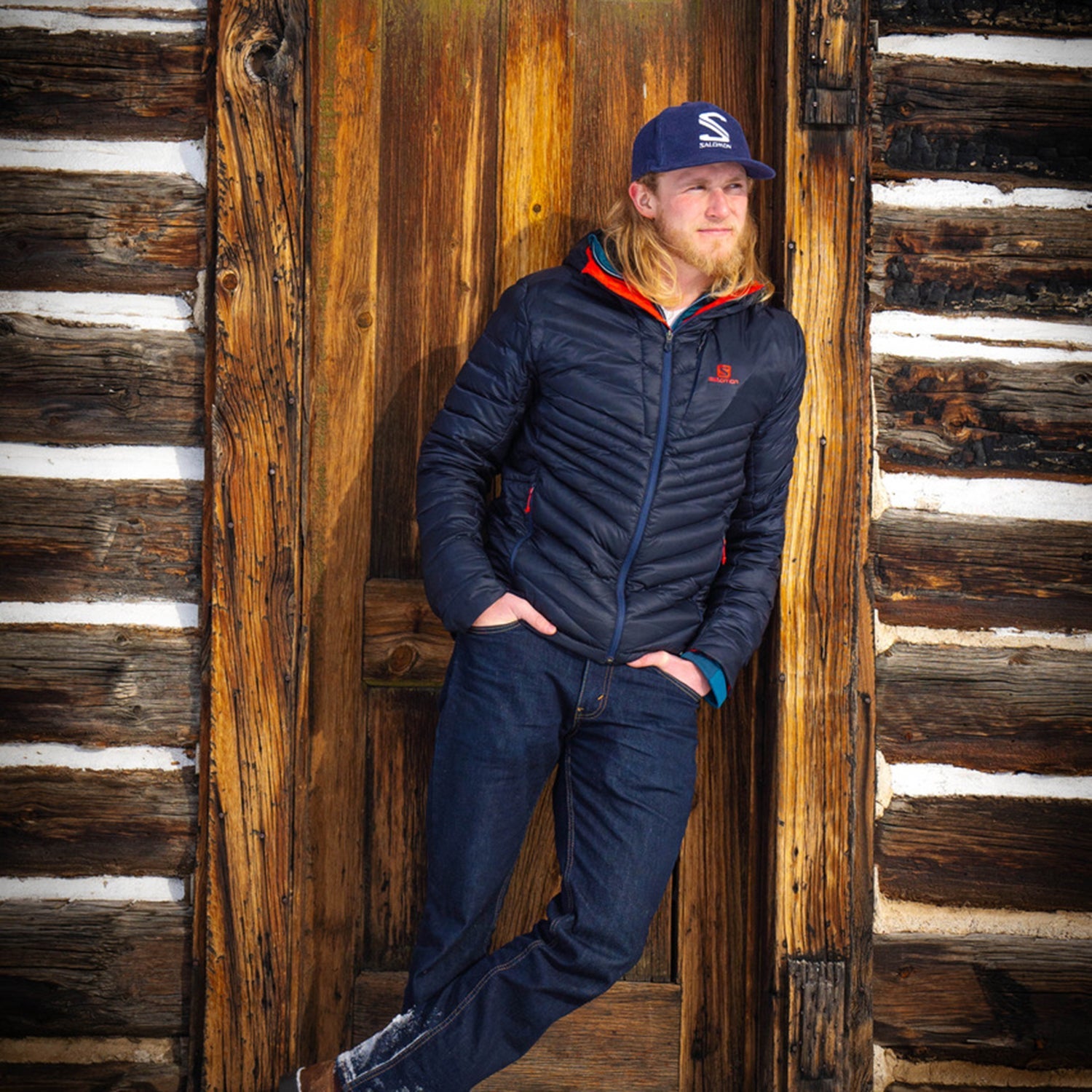If you or someone you know is having thoughts of suicide or self-harm, call the National Suicide Prevention Lifeline toll-free from anywhere in the United States at 1-800-273-8255, or text HOME to the Crisis Text Line at 741741.
I am living the dream. That is, the one that outdoor media has sold us on for as long as I can remember. As a professional skier, I get paid to travel the world and ski powder in front of cameras. But behind closed doors, I’ve been living a much different reality, waging a war within my mind that nearly resulted in me taking my own life.
Four years ago, on May 10, 2017, I heard the distinct gunshot crack of rockfall while , in Oregon. A rock about the size of a microwave fell 40 feet off a cliff above me, landing directly on the back of my head, the middle of my upper back, and my left arm.
With the help of my helmet, I had cheated death: an inch of plastic and high-density foam was all that kept the rock from penetrating my skull. At the very least, I cheated paralysis—my neck and back were miraculously unbroken. And despite the fact that my ski partner and I had to apply a tourniquet to my left arm to stop the bleeding long enough to get off the mountain and into a helicopter, I got to keep all my limbs, too. The trauma center doctors were shocked that I wasn’t more hurt.
It was the first rock we’d heard or seen fall all day. What were the odds that it would fall exactly where I was standing? Rationally, I knew it was just chance. But I still wondered if there was a reason the rock fell on me, and whether there was a reason I survived. It felt like the mountains had chosen to punish me that day, but the doctors told me I was so lucky that I should buy a lottery ticket. Was I deeply fortunate, or did I have a mark on my back? How could I move forward not knowing?
The culture surrounding the mountains doesn’t allow much space for vulnerability. When I was growing up, my male role models—ski coaches, older and professional skiers, guides—never showed weakness, or really any emotion other than stoke. Skiing celebrates this version of masculinity and a party-hard, ski-hard, stay-hard mentality. I perpetuated it myself, too. I would ski through injuries and partied regularly, often getting no more than a few hours of sleep before big days in consequential terrain. When a friend of mine suffered a tragic accident in the mountains, I drank so much that I blacked out by 7 P.M. at a fundraiser for his medical bills, while he lay lifeless in a coma. He later succumbed to his injuries.
This community’s optimism and stoke have a dark side: its rosy, good-vibes-only view of the world also turns a blind eye to the complicated, messy, and hard parts. Overwhelming positivity can feel toxic when your life, for whatever reason, isn’t meeting those expectations.

In the year after my accident, I struggled to adjust back to normal life. I felt like a ghost following my body around. In the mountains, I perceived everything as a constant threat. I questioned each decision, the stability of each slope and cornice, and the security of each rock. Emotionally, I felt out of control, confused, and isolated, which led me to sever friendships and romantic relationships.
My sense that I had cheated death evolved into a cemented belief that I should be dead. Soon that thought grew darker: that maybe I should make that happen myself. I contemplated suicide in silence and looked to the mountains for opportunities to die, thinking that my time would come again in the form of an avalanche. I was terrified by my own mind, distraught at how the accident had twisted my sense of reality. Though I understood the magnitude and finality of my suicidal thoughts, I could not stop them.
My reality felt unwelcome in this idyllic world of mountain sports, where everyone seems to be psyched and having a great time, every day. I had bolstered this idealism myself for years by chronicling my highs with a chipper persona and on . My physical and emotional struggles felt like something I had to handle privately. If I was strong enough to climb mountains and ski big lines, shouldn’t I be able to handle this accident and its aftereffects on my own? In the end, asking for help called for more strength than anything I’ve ever done.
Eventually, my emotional trauma manifested physically. My body began falling apart, forcing me to finally confront my demons. After multiple dislocations in the winter of 2018, I needed surgery on both shoulders, so my ski season ended early. Then, in August 2018, I fell while trail running, broke my collarbone, and sustained a minor concussion. I masked my pain, downplaying the situation to others, as I always did. But when I was in private, the physical injury gave way to emotional pain. I began sobbing hysterically. The fractured bone was a metaphorical breaking point, and I accepted that I needed help.
That August, 15 months after the rockfall accident, in a state of desperation, I found a therapist. As I walked down the long white hallway and into her office for the first time, I felt ashamed to be there. But when she asked if I was having thoughts of suicide, I broke down and gave voice to what I had kept to myself for so long.

My therapist diagnosed me with PTSD, which was validating—I wasn’t just making this up. We worked through that together, with a combination of traditional talk therapy and eye-motion desensitization and reprocessing. During EMDR, I would revisit the accident, while vibrating nodes in my hands led my eyes side to side. This practice relies on bilateral processing in the brain, helping it to rewrite cemented beliefs with more positively framed narratives. I didn’t need to determine if there was a reason why the rock fell on me or find an answer to whether the mountains wanted me dead. I only needed to process the experience and accept that it had happened. I went from believing “I should be dead” to a true, simple, and grounded “I survived that day.”
By January of 2019, I began to feel like I had a handle on the PTSD. But my mind was still in turmoil: I was riding a roller coaster of extreme highs and deep, dark lows. In my highs, I was drinking compulsively and taking impulsive risks in the mountains as a coping strategy. On one film shoot, I sustained head trauma yet kept drinking—heavily—with bandages on my forehead for the rest of the trip. I later learned I had sustained a severe concussion.
These experiences gave me a fleeting sense of happiness and emotional control. But without fail, following these highs, I would descend into terrifying depressive episodes. Killing myself was the first thought to greet me in the morning, before I even opened my eyes. At my worst, I was sitting on the edge of my bed at 2 A.M., staring at eight bottles of opioids, deliberating whether or not to end my own life.
Finally, in August 2019, I was diagnosed with and post-concussion syndrome. I was relieved, and once again felt validated by the diagnoses; they helped me understand why I felt like I was careening out of control.
Post-concussion syndrome meant I was operating at a compromised level due to the aftereffects of undiagnosed and unhealed brain injuries—including the one from the rockfall accident. It’s important to note that brain injuries don’t create mental health problems or suicidal ideation, but they can exacerbate their intensity. While my brain injuries were invisible to those around me, they were something tangible, something that made me realize how mental and emotional health were just like physical health.
One day at a brain-rehab appointment—where I worked to rewire certain mental patterns through —I couldn’t stop crying hysterically. I told my physical therapist I was sorry for being distraught and unstable, but she stopped me. “If you broke your leg and came to me for help, you wouldn’t apologize,” she said. “This is no different.”
Recovery hasn’t been straightforward. I actively work to manage my bipolar disorder through continued therapy and a renovation of my lifestyle, including a meditation practice and sobriety, as well as medication. I will continue to learn to better manage it for the rest of my life. Brain rehab was a grueling, nonlinear process all its own. And my body continued to deteriorate under the weight of my emotional trauma: I had surgery on a torn labrum in my hip in 2019, and in 2020, my ski season ended early again with a knee fracture and more shoulder surgery. But last winter I finally made it through injury-free.
The negative power that all this used to hold over me was rooted in silence. I felt ashamed because my diagnoses didn’t fit in with my seemingly perfect life. But learning to share my own struggles ultimately saved my life. Oftentimes that vulnerability is met with the eyes of a friend who looks like they’re not alone for the first time. In truth, all of this is more common than we realize.
The Rocky Mountain states consistently This eerily named Suicide Belt is home to the would-be paradises that skiers and outdoor enthusiasts call home. In 2016, a string of three suicides in two weeks in San Miguel County, Colorado, where Telluride is located, contributed to that county’s suicide rate being over three times higher than the national average that year. In Summit County, Colorado, two high schoolers at my alma mater died by suicide within two weeks last spring, followed by two subsequent attempts. Beyond the shocking statistics are communities, friends, and families left to grieve and wonder how to tackle this mounting problem.
My whole life I’ve been celebrated for what I can do on a pair of skis. But what if the our community celebrated people for taking care of their mental health in the same way? I believe that if we start honoring mental health like we honor getting rad in the mountains, lives will be saved. Much like my own journey, building a culture that supports mental health starts with talking about it.
This past winter was different for me. My season was built on a foundation of deep, fulfilling conversations on skin tracks and chairlifts. I took joy in the purity of arcing a turn. I taught my girlfriend to ski. I still took risks, but no longer as a way to cope with inner turmoil. I found joy in the rush of adrenaline, but I also found it in harnessing meditative breath to calm my fear and stay mindful. It worked, too: I’m skiing the best I ever have. I hit my biggest cliff yet, and skied fast, committing lines for the cameras. Most importantly, I stayed healthy. This winter was first and foremost a celebration of my own mental well-being. I lived my dream and was fully present and grateful to be in the mountains—more so than ever before.


